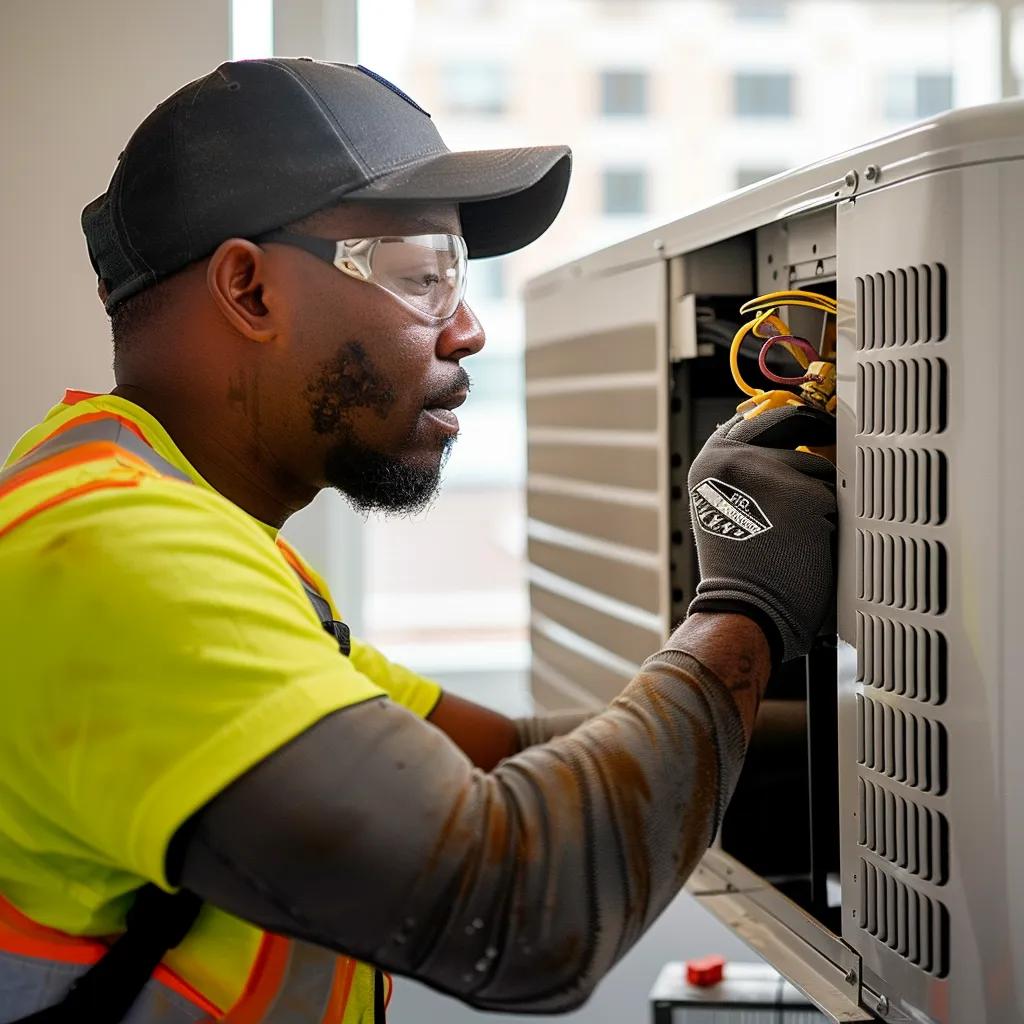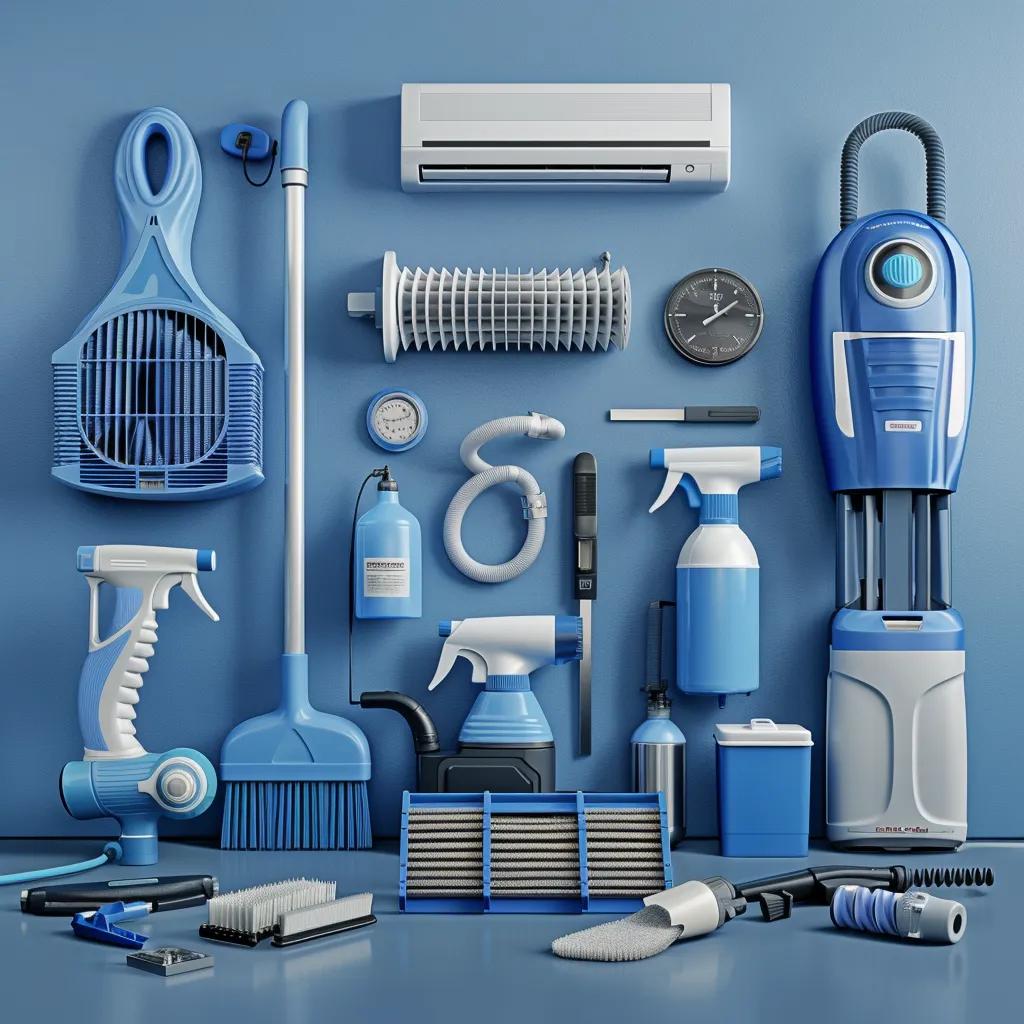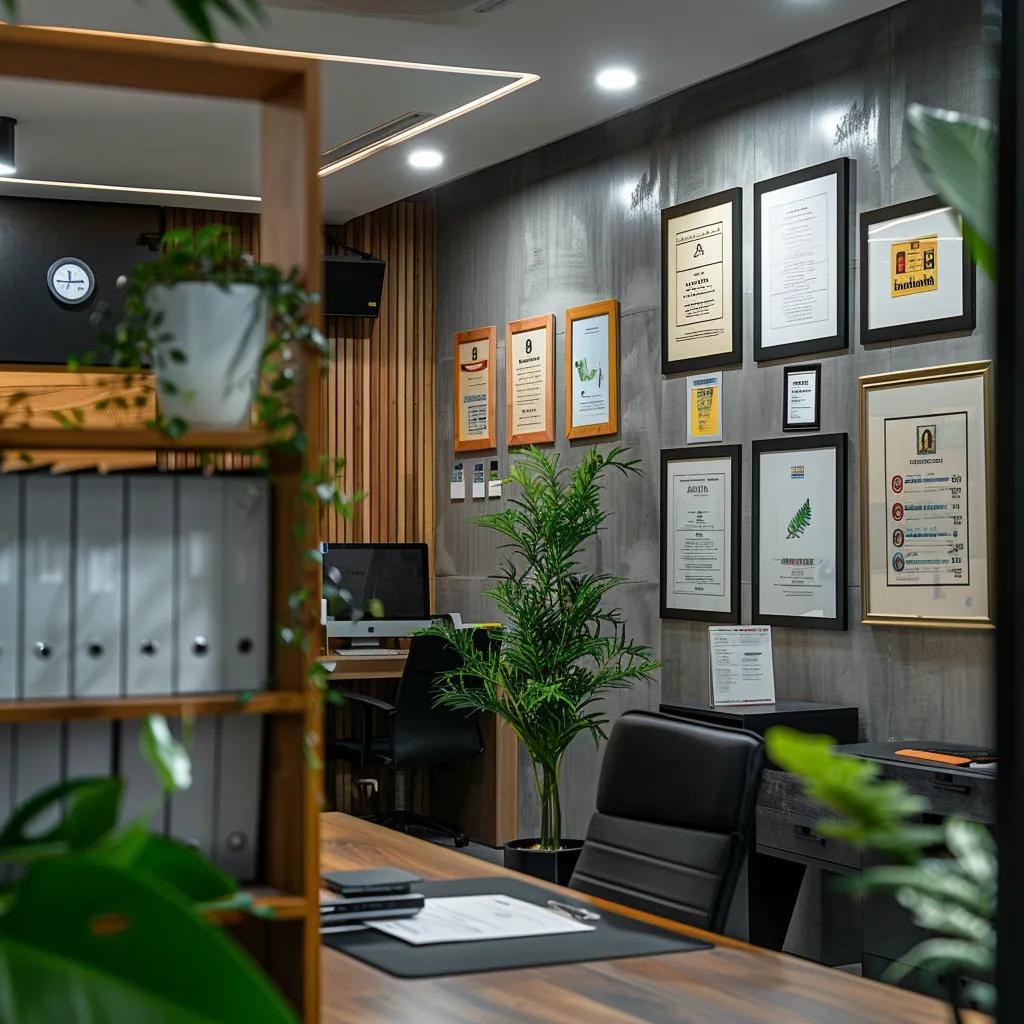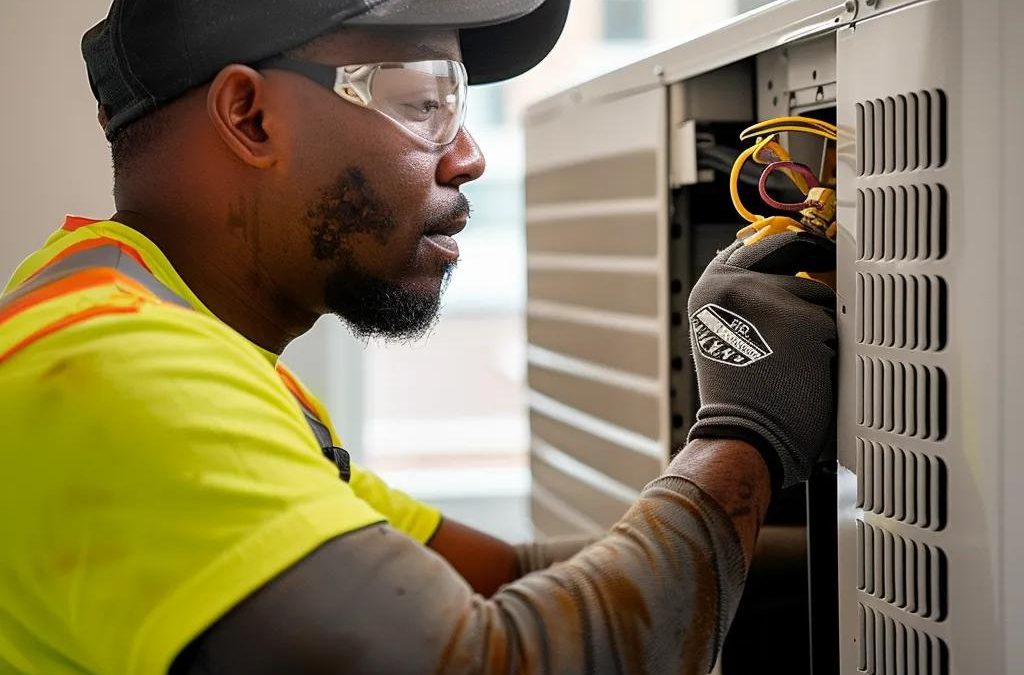
How to Choose the Right HVAC Cleaning Service in NYC for Effective Indoor Air Quality and Energy Efficiency

More than 65% of New York City buildings suffer from compromised indoor air quality due to neglected HVAC systems, increasing health risks and driving up energy bills. Choosing the right HVAC cleaning service in NYC ensures healthier air and longer system lifespan without hidden costs or compliance headaches. In this guide, you will discover what professional HVAC cleaning entails, key certifications to vet, cost factors and transparent quoting, the step-by-step cleaning process, NYC-specific regulations, reputation checkpoints, and post-service maintenance best practices. Restoration Experts a NADCA- and IICRC-certified firm offering 24/7 emergency support, insurance claim facilitation, and comprehensive air quality testing—underpins each section with real-world solutions.
What Is HVAC Cleaning and Why Is It Important for NYC Homes and Businesses?

HVAC cleaning is the professional removal of dust, mold, and other contaminants from heating, ventilation, and air conditioning components to improve indoor air quality, system efficiency, and occupant health. By extracting debris and microbial growth, specialists restore proper airflow and prevent allergens from circulating throughout a property.
What Does Professional HVAC Cleaning Include?
Before cleaning begins, technicians perform a full assessment of ducts, coils, vents, and blowers. Typical service components include:
- Source removal vacuuming with HEPA-filtered systems
- Coil brushing and sanitization with EPA-registered agents
- Duct encapsulation using FDA-approved sealants
- Component disassembly for deep cleaning of fan blades and housings
- Filter replacement with MERV-rated or HEPA filters
Each task eliminates pollutants and prepares the system for optimal performance. Next, we’ll explore how these steps translate into measurable health gains.
How Does HVAC Cleaning Improve Indoor Air Quality and Health?
Professional HVAC cleaning improves indoor environments by:
- Removing mold spores and bacteria that trigger allergies
- Capturing dust and pet dander to reduce asthma attacks
- Eliminating VOCs and odors for fresher air
- Preventing cross-contamination between zones
These benefits translate into fewer sick-building incidents and enhanced occupant comfort, leading to lower absenteeism and higher productivity. Understanding these gains sets the stage for recognizing when cleaning is needed.
What Are the Signs You Need HVAC Cleaning in NYC?
When HVAC systems exhibit any of the following signs, cleaning is overdue:
- Visible dust blowing from vents
- Persistent musty or moldy odors
- Unexplained spikes in energy consumption
- Allergy or respiratory symptom flare-ups
- Recent water damage or mold remediation events
Detecting these indicators early allows for prompt intervention and preserves both air quality and equipment health.
How Does HVAC Cleaning Enhance Energy Efficiency and System Lifespan?
Clean HVAC systems operate with less static pressure, which:
- Improves heat exchange by up to 15%
- Reduces HVAC motor workload and electricity use
- Minimizes emergency breakdowns and downtime
- Extends component life by preventing corrosion and wear
Impact of HVAC Cleaning on Energy Efficiency
Clean HVAC systems operate with less static pressure, improving heat exchange and reducing energy consumption. Routine cleaning can improve heat exchange by up to 15%, reduce HVAC motor workload, and extend component life by preventing corrosion and wear, leading to utility savings and capital preservation.
U.S. Department of Energy, Energy Efficiency in Buildings (2024)
This research supports the article’s claims about the energy-saving benefits of HVAC cleaning, reinforcing the importance of regular maintenance.
Investing in routine cleaning pays dividends in utility savings and capital preservation.
Which Certifications Should You Look for When Choosing an HVAC Cleaning Service?

When selecting a provider, certifications guarantee adherence to industry best practices, safety protocols, and quality standards. Always verify credentials to ensure you receive certified expertise aligned with NYC requirements.
What Is NADCA Certification and Why Does It Matter?
NADCA certification demonstrates compliance with the ACR Standard—recognized for defining protocols in duct cleaning, containment, and verification. A NADCA-certified firm:
- Employs ASCS-qualified technicians
- Follows documented cleaning procedures
- Provides before-and-after validation reports
These credentials ensure that service aligns with leading scientific guidelines for air system sanitation.
NADCA Certification Standards
NADCA certification signifies adherence to the ACR Standard, which defines protocols for duct cleaning, containment, and verification, ensuring that service aligns with leading scientific guidelines for air system sanitation. A NADCA-certified firm employs ASCS-qualified technicians and provides before-and-after validation reports.
NADCA, ACR Standard for HVAC System Cleaning
This standard provides a framework for ensuring quality and consistency in HVAC cleaning practices, which is directly relevant to the article’s discussion of NADCA certification.
| Entity | Attribute | Value |
|---|---|---|
| NADCA Certification | Standard | ACR, The NADCA Standard for HVAC System Cleaning |
| ASCS Technician | Qualification | NADCA-accredited Specialist in Source Removal |
| Certified Firm | Verification Document | Pre- and post-cleaning reports with particle counts |
This certification foundation leads us to explore complementary credentials for mold and water-affected systems.
How Does IICRC Certification Relate to HVAC and Mold Remediation?
IICRC credentials—such as WRT (Water Restoration Technician) and AMRT (Applied Microbial Remediation Technician)—signify competence in restoring water- or mold-impacted environments. An IICRC-certified HVAC cleaner will:
- Mitigate cross-contamination risks
- Employ containment barriers and negative-pressure systems
- Document antimicrobial treatments and clearance testing
This alignment with mold remediation standards is crucial when HVAC issues stem from past water damage.
How to Verify a Company’s Certifications and Technician Credentials?
To confirm authenticity:
- Request copies of NADCA and IICRC certificates
- Check expiration dates and active-status online
- Ask for technician IDs and training records
- Review sample inspection and validation reports
Verifying credentials ensures you partner with a fully qualified team.
How Much Does HVAC Cleaning Cost in NYC and What Affects Pricing?
HVAC cleaning pricing varies based on system size, complexity, and contaminant levels. Transparent quotes protect against hidden fees and unexpected expenses.
What Are Typical Pricing Models for HVAC Cleaning Services?
Most providers use one of these models:
- Per-Vent Pricing – Flat rate per supply or return grille
- System-Wide Flat Fee – All-inclusive charge for complete system
- Hourly Rate – Technician hourly fee plus materials
- Tiered Service Packages – Basic, Standard, and Premium bundles
How to Get Transparent Quotes and Avoid Hidden Fees?
To ensure clarity:
- Request itemized quotes with labor, materials, and disposal costs
- Confirm whether moisture mitigation or mold remediation incurs extra fees
- Ask if follow-up inspections or air quality testing are included
- Compare at least three providers to benchmark fair pricing
A comprehensive estimate prevents surprise charges and ensures trust.
Can Insurance Cover HVAC Cleaning After Water or Mold Damage?
Yes, many homeowners’ or commercial policies cover HVAC cleaning when linked to documented water damage or mold events. Restoration Experts assists with claim facilitation by:
- Coordinating with insurers on scope documentation
- Providing detailed loss reports and validation testing
- Often reducing or eliminating out-of-pocket costs
Leveraging insurance support maximizes your investment in system restoration.
What Is the Step-by-Step HVAC Cleaning Process Used by Professionals in NYC?
A clear, standardized process builds confidence and predictable outcomes. Certified technicians follow a multi-stage workflow to deliver measurable results.
How Are HVAC Systems Inspected Before Cleaning?
Inspection protocols include:
- Visual assessment of accessible duct runs and plenums
- Infrared scanning for hidden moisture or thermal leaks
- Particle counting to establish baseline air quality
- System performance checks for airflow and pressure measurements
Thorough assessment defines cleaning scope and sets performance benchmarks.
What Cleaning Methods and Equipment Are Used, Including HEPA Filtration?
Professionals employ:
| Method | Equipment | Benefit |
|---|---|---|
| Source Removal Vacuuming | HEPA-filtered vacuums | Captures 99.97% of particles ≥0.3 microns |
| Coil Brushing | Rotary brush tools | Dislodges grime for deeper sanitization |
| Air Knife Agitation | Compressed air devices | Clears debris without surface damage |
| Negative-Pressure Containment | Portable negative-air machines | Prevents cross-contamination |
These techniques ensure comprehensive contaminant extraction and safe debris disposal.
How Is Mold or Contaminant Removal Handled During HVAC Cleaning?
When mold is present, specialists:
- Establish containment zones with poly barriers
- Use HEPA vacuums and antimicrobial foggers
- Employ chemical or natural biocides approved by IICRC
- Perform clearance testing to confirm microbial counts meet NADCA thresholds
This structured approach safeguards occupant health and regulatory compliance.
What Happens After Cleaning: Filter Replacement and Air Quality Testing?
Post-service steps include:
- Installing new MERV-rated or HEPA filters
- Performing particle count or VOC sampling
- Issuing a detailed validation report with before/after metrics
- Scheduling routine maintenance checks
Verifying system performance demonstrates tangible indoor air quality improvements.
What NYC-Specific Regulations and Building Codes Affect HVAC Cleaning Services?
Local laws and codes ensure building safety, energy efficiency, and environmental responsibility in New York City’s unique regulatory landscape.
How Do Local Laws 87 and 97 Impact HVAC Maintenance and Cleaning?
Local Law 87 mandates energy audits and retro-commissioning for buildings over 50,000 sq ft, while Local Law 97 sets emissions caps requiring optimized HVAC operation. Compliance demands:
- Regular system cleaning to maintain designed airflow
- Documentation of energy-saving measures
- Coordination with licensed energy auditors
Adhering to these laws reduces penalties and enhances building performance.
What Are NYC Building Code Requirements for HVAC Systems?
Key code provisions include:
- Minimum ventilation rates per ASHRAE Standard 62.1
- Insulation and sealing specifications for ducts
- Access panel requirements for inspection and cleaning
- Fire and smoke damper maintenance protocols
Meeting these standards ensures safe, efficient, and code-compliant HVAC operation.
How Do Commercial and Residential HVAC Cleaning Needs Differ in NYC?
| Entity | Attribute | Value |
|---|---|---|
| Residential | Frequency | Every 3–5 years or after major events |
| Commercial | Frequency | Annually or per audit/retro-commissioning |
| Residential | Compliance Focus | Indoor air quality and allergy control |
| Commercial | Compliance Focus | Energy audit reporting and emissions |
Commercial properties often require stricter documentation and more frequent service for regulatory filings.
How to Evaluate HVAC Cleaning Companies in NYC for Experience and Reputation?
Evaluating experience and trustworthiness reduces buyer’s remorse and ensures quality outcomes.
What Role Do Customer Reviews and Testimonials Play?
Positive reviews signal consistent performance and reliability:
- Highlight real-world case studies and before/after photos
- Verify third-party ratings on Google Business Profile
- Look for comments on professionalism, timeliness, and cleanup
These insights reflect actual service quality and customer satisfaction.
How to Check Company Track Records and Employee Vetting?
Reputable firms provide:
- Background checks and drug-screening for technicians
- Proof of insurance and licensing
- Project portfolios with scope and outcome summaries
- References from property managers, insurers, or building officers
Thorough vetting safeguards your property and occupants.
Why Choose a Company Offering 24/7 Emergency HVAC Cleaning Services?
Emergency response capabilities:
- Prevent mold or contaminant spread after water intrusions
- Restore critical systems in commercial facilities without shutdowns
- Minimize business interruption and liability risks
Opting for around-the-clock support ensures rapid mitigation and peace of mind.
How Can You Maintain Indoor Air Quality After HVAC Cleaning in NYC?
Sustaining clean air requires routine care and monitoring to prevent system degradation and pollutant buildup.
What Are Best Practices for Regular HVAC System Maintenance?
Consistent maintenance includes:
- Changing filters every 3 months (or per MERV rating)
- Scheduling bi-annual professional checkups
- Sealing duct leaks and insulating exposed runs
- Monitoring thermostat calibration and airflow balance
Proactive upkeep preserves cleaning outcomes and system health.
How Often Should HVAC Ducts Be Cleaned in NYC?
Duct cleaning frequency depends on:
- Occupant sensitivity (allergies, asthma)
- Building usage patterns (pet owners, renovations)
- History of water or mold events
In general, every 3–5 years is recommended, with adjustments for specific risk factors.
What Are Signs That Indicate the Need for Repeat Cleaning or Inspection?
Repeat service may be needed when you observe:
- Sudden return of dust or odors
- Unexplained humidity or condensation in vents
- Unusual noises signaling airflow restriction
Addressing these issues early maintains indoor air quality and prevents system strain.
By following these guidelines and partnering with a NADCA- and IICRC-certified firm like Restoration Experts, you ensure healthy environments, optimized energy performance, and full compliance with NYC regulations. Contact our team today for a detailed quote or immediate emergency assistance—because clean air and efficient HVAC operation can’t wait.
Conclusion
Maintaining optimal indoor air quality and energy efficiency in NYC is achievable through professional HVAC cleaning services. By choosing a certified provider, you ensure a healthier environment, reduced energy costs, and compliance with local regulations. Don’t wait for visible signs of neglect; prioritize your air quality and system performance today. Reach out to our team for a comprehensive quote and experience the benefits of clean, efficient HVAC systems.
